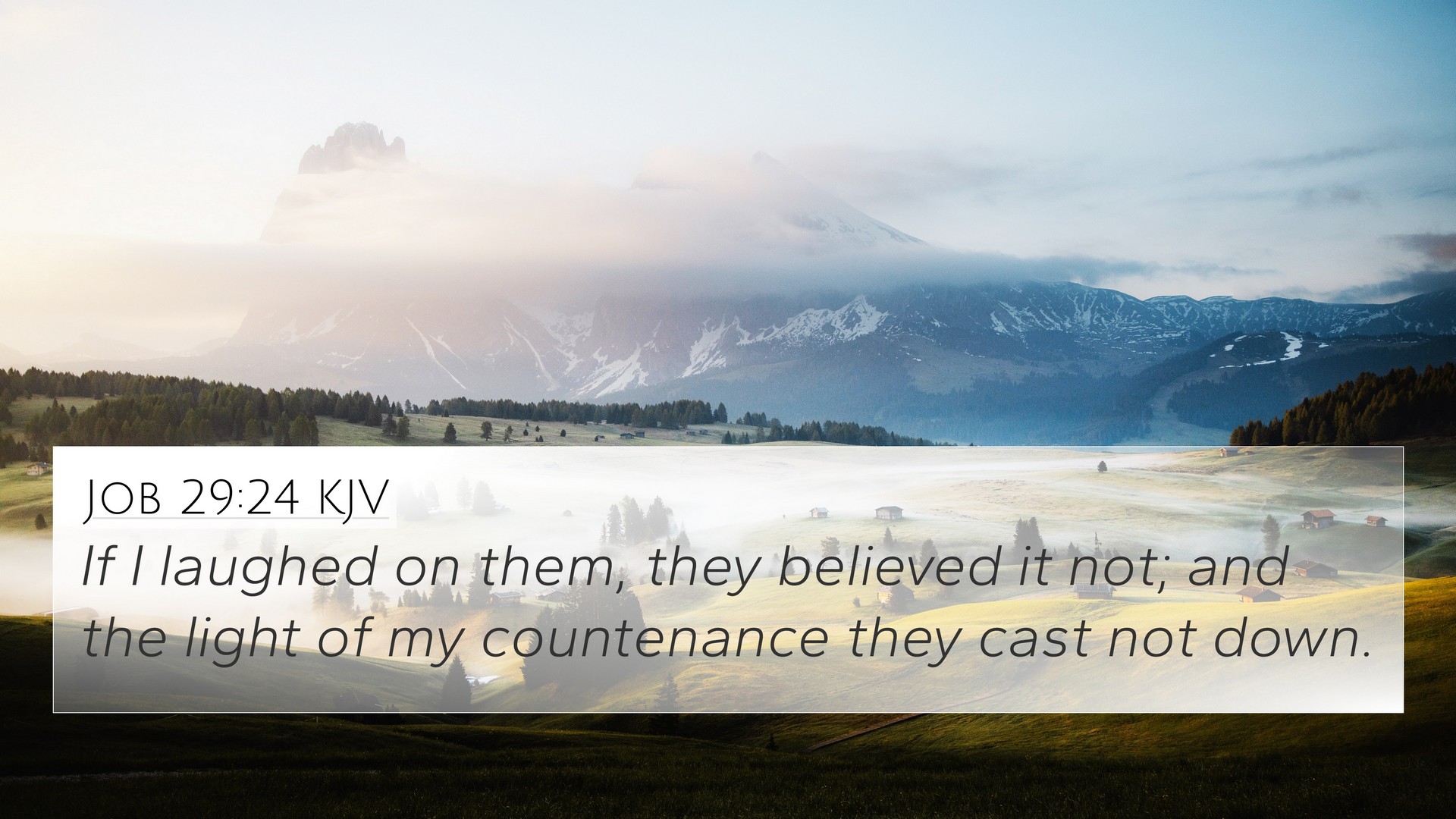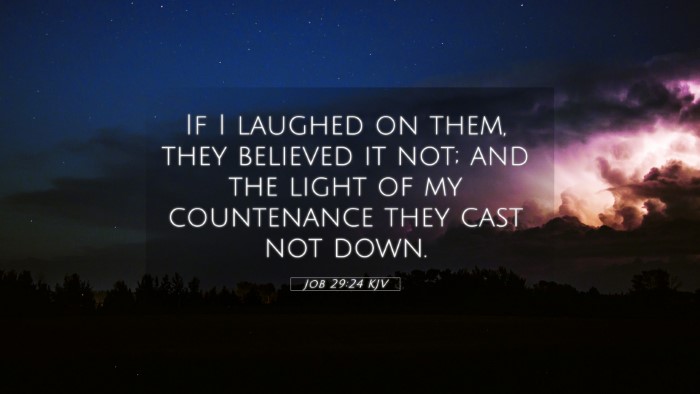Old Testament
Genesis Exodus Leviticus Numbers Deuteronomy Joshua Judges Ruth 1 Samuel 2 Samuel 1 Kings 2 Kings 1 Chronicles 2 Chronicles Ezra Nehemiah Esther Job Psalms Proverbs Ecclesiastes Song of Solomon Isaiah Jeremiah Lamentations Ezekiel Daniel Hosea Joel Amos Obadiah Jonah Micah Nahum Habakkuk Zephaniah Haggai Zechariah MalachiJob 29:24 Similar Verses
Job 29:24 Cross References
If I laughed on them, they believed it not; and the light of my countenance they cast not down.
Uncover the Rich Themes and Topics of This Bible Verse
Listed below are the Bible themes associated with Job 29:24. We invite you to explore each theme to gain deeper insights into the Scriptures.
Job 29:24 Cross Reference Verses
This section features a detailed cross-reference designed to enrich your understanding of the Scriptures. Below, you will find carefully selected verses that echo the themes and teachings related to Job 29:24 KJV. Click on any image to explore detailed analyses of related Bible verses and uncover deeper theological insights.
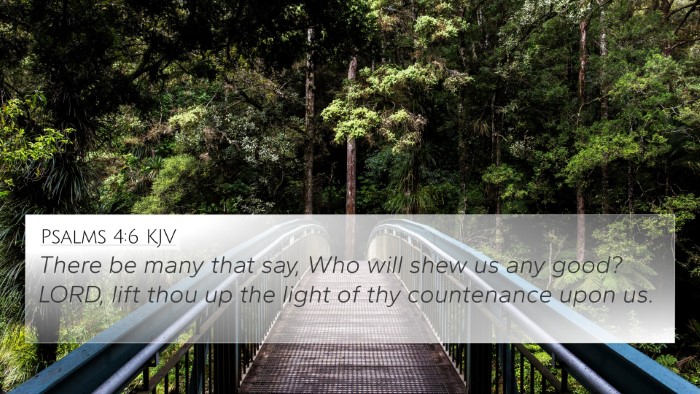
Psalms 4:6 (KJV) »
There be many that say, Who will shew us any good? LORD, lift thou up the light of thy countenance upon us.
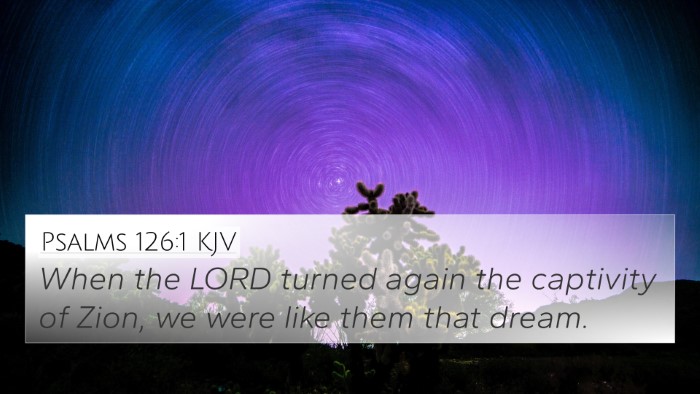
Psalms 126:1 (KJV) »
When the LORD turned again the captivity of Zion, we were like them that dream.
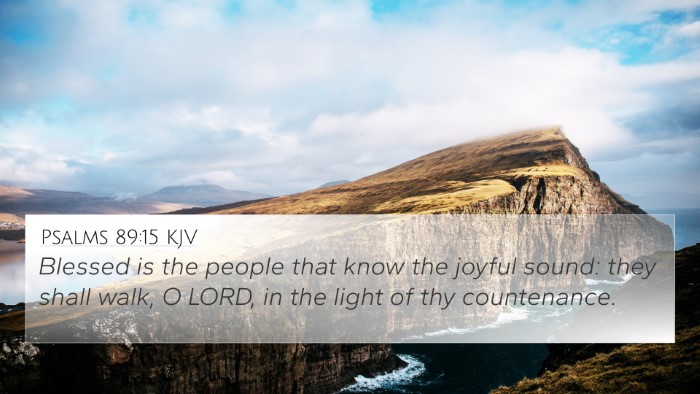
Psalms 89:15 (KJV) »
Blessed is the people that know the joyful sound: they shall walk, O LORD, in the light of thy countenance.

Genesis 45:26 (KJV) »
And told him, saying, Joseph is yet alive, and he is governor over all the land of Egypt. And Jacob's heart fainted, for he believed them not.
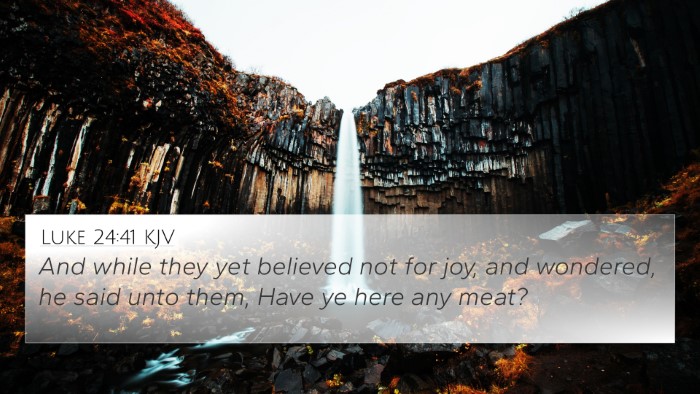
Luke 24:41 (KJV) »
And while they yet believed not for joy, and wondered, he said unto them, Have ye here any meat?
Job 29:24 Verse Analysis and Similar Verses
Job 29:24 - Understanding the Verse
Job 29:24 states: "If I smiled at them, they did not believe it; and the light of my countenance they did not cast down."
Verse Meaning and Interpretation
This verse comes from a chapter where Job reminisces about his past, detailing the respect and admiration he received from his peers when he was prosperous. The essence of this passage captures Job's longing for the days when his presence brought joy and security to others.
- Matthew Henry's Commentary: Henry notes that Job reflects on his previous state of honor and integrity. His smile signified trust and joy that was not reciprocated as it once had been, indicating a deep shift in his circumstances.
- Albert Barnes' Notes: Barnes emphasizes the significance of Job’s acknowledgment of how his demeanor influenced others. He implies that Job, despite his current suffering, recalls how positively he impacted those around him, signifying his former stature.
- Adam Clarke's Commentary: Clarke delineates the psychological aspect of Job's reflection. He suggests that the smile symbolized a state of personal satisfaction and divine favor which appeared absent in Job’s current plight.
Thematic Connections
This verse illustrates profound themes of loss, reputation, and the social influence one wields. Job’s sorrowful reminiscence indicates not just a personal loss but also a communal shift affecting those around him.
- Job’s transition from esteemed friend to misunderstood sufferer.
- The psychology behind rejection of kindness and the hardening of hearts.
- Indicators of divine favor in societal acceptance.
Bible Cross References
Job 29:24 resonates with several other Biblical scriptures that shed light on similar themes of reputation and social influence:
- Proverbs 16:15: “In the light of the king’s countenance is life; and his favor is as a cloud of the latter rain.”
- Psalms 34:5: “They looked unto him, and were lightened: and their faces were not ashamed.”
- Job 31:24-25: “If I have made gold my hope, or have said to the fine gold, Thou art my confidence;”
- Jeremiah 15:16: “Thy words were found, and I did eat them; and thy word was unto me the joy and rejoicing of mine heart.”
- Psalms 102:12: “But thou, O Lord, shalt endure forever; and thy remembrance unto all generations.”
- Proverbs 13:15: “Good understanding giveth favour: but the way of the transgressors is hard.”
- Ecclesiastes 7:1: “A good name is better than precious ointment...”
- Isaiah 60:1-2: “Arise, shine; for thy light is come, and the glory of the Lord is risen upon thee.”
- Galatians 6:2: “Bear ye one another's burdens, and so fulfil the law of Christ.”
- Matthew 25:40: “And the King shall answer and say unto them, Verily I say unto you, Inasmuch as ye have done it unto one of the least of these my brethren, ye have done it unto me.”
Exploring Connections Between Bible Verses
The connections between Job 29:24 and the above Scriptures reveal a consistent Biblical narrative on the value of one’s countenance, reputation, and the societal ripple effects of one's conduct.
- Understanding the value of a good reputation as evident in Ecclesiastes 7:1 can be linked to Job's longing for past esteem.
- Proverbs 16:15's insight into how a king's countenance brings life resonates with Job's missed interactions.
- The themes of shame and light in Psalms 34:5 parallel Job’s painful realization about interpersonal dynamics.
Cross-Referenced Themes
Cross-referencing this verse unveils the broader themes of human relationships and community support during trials:
- Trust and Belief: Job's experience illustrates the fragility of trust in relationships amidst adversity.
- Countenance and Influence: The powerful effect one's demeanor has on others serves as a cautionary ideal for believers.
- Hope and Despair: Job's longing for the past reflects a deeper philosophical question of hope in times of despair.
Conclusion
Job 29:24 calls forth reflection on human dignity, reputation, and the social fabric that weaves individuals together. The emotional depth of Job's words reminds believers of the importance of interpersonal relationships and the divine light we are called to shine for others. In studying this verse through cross-referencing with others, one can appreciate the layered meanings within Scripture, enriching both personal faith and communal dialogue.
